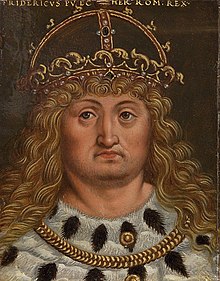Frederick the Fair
The royal title held by his father and grandfather however passed to Count Henry VII of Luxembourg, who was elected by six of seven votes, contrived by the mighty Archchancellor Peter of Aspelt, elector and prince-archbishop of Mainz, a fierce opponent of late King Albert.Both tried for the support by the Imperial States; Frederick was enfeebled by the fact that he had been crowned at the wrong place and moreover struggled with the rebellious Swiss Confederacy in the Swabian home territories of the Habsburgs, suffering a crushing defeat at the 1315 Battle of Morgarten.He nevertheless was able to hold his ground against the Wittelsbach rival and after several years of bloody war, victory finally seemed to be within Frederick's grasp, as he was strongly supported by the forces of his younger brother Leopold I.Since the Pope and the prince-electors strongly objected to this agreement, another treaty was signed at Ulm on 7 January 1326, according to which Frederick would govern Germany as king, while Louis would be crowned emperor by the "people of Rome" under Sciarra Colonna in 1328.Frederick's gracious return to captivity inspired Friedrich Schiller to write his poem Deutsche Treue ("German Loyalty") and Uhland to his tragedy Ludwig der Bayer ("Louis the Bavarian").
King of the RomansKing of GermanyLouis IVCoronationHenry VIIDuke of AustriaStyriaLeopold IAlbert IAlbert IIOtto the MerryViennaDuchy of AustriaHoly Roman EmpireGutensteinMauerbach CharterhouseDucal Crypt, ViennaIsabella of AragonAnna, Duchess of BavariaHouse of HabsburgAlbert I of GermanyElizabeth of CarinthiaGermananti-kingGermanyElisabeth of Gorizia-TyrolMeinhardinerHabsburgRudolph IRudolph IIIAustriaHenry VII of LuxembourgelectedPeter of AspeltLouis IV of BavariatutelageStephen I of Lower BavariaBattle of Gammelsdorfcrowned emperorPope Clement VJohn of BohemiaFrankfurtSachsenhausenHenry IICologneHenry of CarinthiaSaxe-WittenbergPeter von AspeltBaldwinWaldemar of BrandenburgJohn II of Saxe-LauenburgAscanianDeclaration of RhenseGolden Bull of 1356Aachen CathedralBonn MinsterHeinrich von VirneburgImperial StatesSwiss ConfederacySwabianBattle of MorgartenMühldorfAmpfing HeathArchbishopric of SalzburgUpper PalatinatePope John XXIITreaty of TrausnitzMunichanother treatySciarra ColonnaWienerwaldDucal CryptSt. Stephen's CathedralFriedrich SchillerUhlandJames II of AragonBlanche of AnjouHenry XV of BavariaAlbert V of AustriaOriginal lineAlbertCount of HabsburgRudolf Iof GermanyAlbert Iof GermanyRudolf IIDuke of AustriaRudolf Iof BohemiaLeopold IDuke of AustriaAlbert IIDuke of AustriaHenrythe FriendlyOttoDuke of AustriaJohnParricidaAlbertinian lineLeopoldian lineRudolf IVDuke of AustriaFrederick IIIAlbert IIIDuke of AustriaLeopold IIIDuke of AustriaLeopold IIDuke of AustriaAlbert IVDuke of AustriaWilliamDuke of AustriaLeopold IVDuke of AustriaErnestDuke of AustriaFrederick IVDuke of AustriaAlbert IIof GermanyFrederick IIIHREAlbert VIArchduke of AustriaSigismundArchduke of AustriaLadislausthe PosthumousMaximilian IHREPhilip Iof CastileIberianAustrianHRE lineCharles VHREFerdinand IHREPhilip IIof SpainMaximilian IIHREFerdinand IIArchduke of AustriaCharles IIArchduke of AustriaCarlosPrince of AsturiasPhilip IIIof SpainRudolf IIHREErnestof AustriaMatthiasHREMaximilian IIIArchduke of AustriaAlbert VIIArchduke of AustriaWenceslausArchduke of Austria